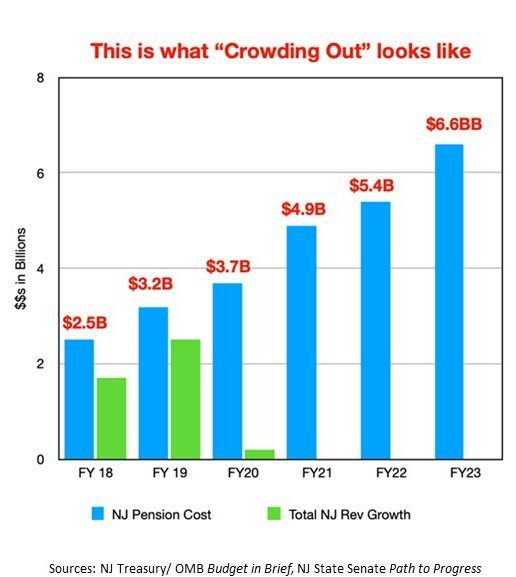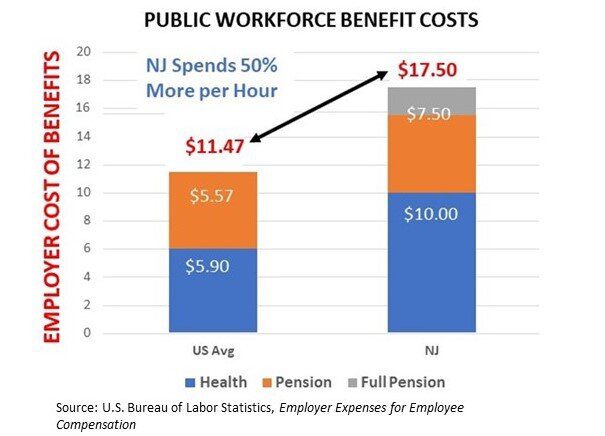Public Spending, ECONOMIC OPPORTUNITY FOR ALL
APP.com: NJ Needs New Economic Priorities in the wake of COVID-19

The following op-ed appeared in the print edition of the Asbury Park Press on April 26th and online at APP.com.
by Regina M. Egea
At a time when most people felt they had to choose sides politically, we suddenly find ourselves saying “we’re all in this together.” Where we had completely differing views of our future, now none of us really has a clear view of next week, never mind next year. Where we are finding more and more agreement though is around certain, stark economic realities: escalating unemployment in the private sector; declining state and local revenue at a time when more demands are on certain public safety and health services; and the prospect of an immediate recovery as unlikely.
New Jersey does not have to emerge from the current health crisis as the state with the highest cost to do business, nor with the highest cost of living for residents, nor having the highest pension and benefit liabilities for our public workforce. This is New Jersey’s Moment. Do we remain last on every list, pleading with others to understand our challenges, or do we take on the hard work to get back in fighting shape?
In the category of “bad news doesn’t keep,” the bolder we are in developing fresh policies to match our “new normal,” the sooner we will drive the difficult but appropriate conversation of what are the truly essential services we need from our government, and what competitive position do those decisions put us in versus other states
Health services, public safety, feeding our most vulnerable, and getting our schools back open certainly all top that “essential” list. Escalating healthcare and public safety expenditures are and will necessarily “crowd out” other priorities. In a world of declining state and local revenues then, what are the policies that will drive our ability to afford these essential services and re-build NJ’s economic muscle?
1) Prioritize government spending on the crisis at hand. We need to affirmatively make room for incremental COVID-19 spending at every level of New Jersey’s government.
· Cut back non-essential government staff and services
· Freeze public pay and hiring
· Open up all reserves and “rainy day funds” for pandemic funding
· Implement pension and healthcare reforms to reduce liabilities and current cash demands as this is the fastest growing component of all NJ public spending.
Independent research conducted for GSI identified a significant opportunity to reduce costs this year. NJ’s public employee benefits cost 50% more than the average of public workers in the U.S. Bringing our public employee health benefit and pension plans in line with U.S. averages would bring tangible and lasting savings to New Jersey taxpayers.
2) Relieve short term financial anxiety and make permanent changes to improve our tax competitiveness
· New Jersey received about $3.4 billion from a $150 billion fund created to help state and local governments struggling amid the COVID-19 crisis. Additionally, New Jersey has invested to relieve today’s cash constraints on both residents and businesses by extending tax filing and payment deadlines, offering relief on mortgages and rents reflecting cooperation from private industry, as well as curtailing service interruptions of essential utilities.
Permanently improving our structural tax competitiveness can be achieved by implementing a hard cap of 0% tax growth in FY 2021 at both the local and state level. Additionally, act to remove all exemptions to the 2% cap in future years, and no new taxes.
Just this past February, GSI illustrated how New Jersey’s Value Proposition stacks up versus our neighboring states, specifically identifying our competitive weaknesses and how much improvement was needed to have a winning Value Proposition. All these essential policy changes are needed in order to convince employers to stay and invest here so that New Jersey jobs can grow along with the tax revenues they produce. Making New Jersey competitive against other states is the only way to grow share, particularly in targeted industries such as Pharmaceutical manufacturing. Given that industry’s move to return essential supply chain functions to the US, a newly competitive New Jersey can secure great paying jobs that are anchored by significant capital investments if we adopt policies for our “new normal”.
Replacing state-funded public salary expense with federally-funded unemployment subsidies papers over our unsustainable cost structure.
Issuing bonds to offset lost revenues is the mistake Atlantic City made more than a decade ago. That city continues to suffer under a debt load that reflects the past not their future.
Seeking incremental federal support for a hobbling pension system and platinum level health benefit plans without accepting any responsibility to modernize either component wreaks of indifference.
We do not need nor should we wait to know the exact date when current economic constraints will be lifted. Turning our attention and commitment to building “new normal” policies can give us first-mover advantage as we “Re-open for Business”.
Out of this public health crisis has emerged a great economic challenge for our state. As we have stepped-up to meet the threat of the COVID-19 pandemic, so too can we overcome our economic hardship. But that victory will hinge on the ability of our state and local leaders to align our economy around a new set of priorities that reflect the assets that can make New Jersey the envy of our nation.
Regina M. Egea is president of the Garden State Initiative, an independent research and educational organization dedicated to promoting new investment, innovation and economic growth in New Jersey.


